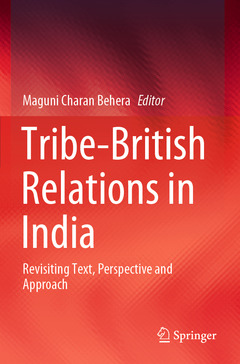Description
Tribe-British Relations in India, 1st ed. 2021
Revisiting Text, Perspective and Approach
Coordinator: Behera Maguni Charan
Language: English
Subject for Tribe-British Relations in India:
Publication date: 09-2022
366 p. · 15.5x23.5 cm · Paperback
Publication date: 09-2021
Support: Print on demand
Description
/li>Contents
/li>Biography
/li>Comment
/li>
This book discusses the colonial history of Tribe-British relations in India. It analyses colonial literature, as well as cultural and relational issues of pre-literate communities. It interrogates disciplinary epistemology through multidisciplinary engagement. It presents the temporal and spatial dimensions of tribal studies. The chapters critically examine colonial ideology and administration and civilization of tribes of India. Each paper introduces a unique context of Tribe-British interactions and provides an innovative approach, theoretical foundation, analytical tool and methodological insights in the emerging discipline of tribal studies. The book is of interest to researchers and scholars engaged in topics related to tribes.
Provides a comprehensive perspective of Tribe-British relations in India
Presents and analyzes the tribal challenges to British imperialism in the region
Explores on the role of tribal participation in the freedom movement of the country



